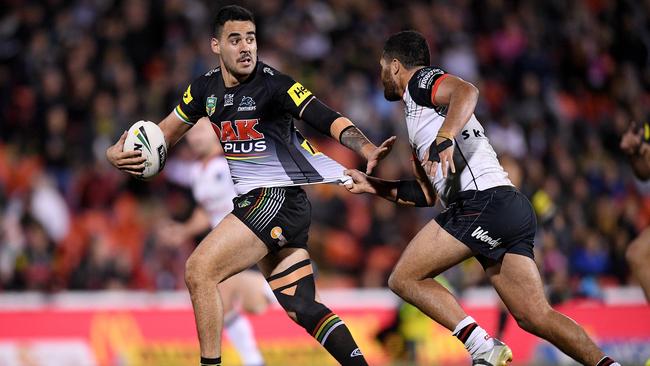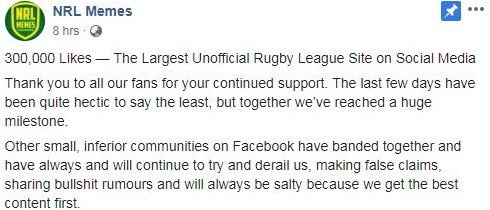Why NRL players need to snap out of it
Sharing sex tapes without a partner’s knowledge has become common in the NRL but it causes terrible damage.

Did anyone take any sexy pictures of you when you were younger? Last century’s lovers used to do that, usually on a Polaroid, since those kinds of photographs didn’t need to be taken to a photo lab to be developed. Way too embarrassing.
Nobody else was meant to see your erotic snaps. People kept them in their wallets or maybe in the top drawer, and when the relationship died, as relationships do, they went in the bin or up in smoke.
Revenge porn? There was no real way to do it.
As for home movies, they were a bit of a thing in the 1980s. People filmed themselves. You knew they did because you’d sometimes hear funny stories about how Mr and Mrs So-and-so had returned their sex tape to the video store in the wrong box by mistake and, oh, how embarrassing.
Only very occasionally, and only when people were very famous, did nudes and sex tapes become public. It happened to Madonna in the 80s when black-and-white shots taken when she was 18 were leaked. It happened to Paul McCartney’s former wife, Heather Mills, whose nudes suspiciously appeared during an ugly divorce. It happened to Paris Hilton, whose sex tape, One Night in Paris, can still be found online; and it more recently happened to Melania Trump, whose shots for a French magazine got dusted off and disseminated during her husband’s campaign for the White House.
Fast forward into the narcissistic, porn-soaked, self-involved, body-conscious 21st century: it is now relatively common, indeed unremarkable, for young people — I’m talking 18 to 30-year-olds whose rigs are still so beautiful — to take all manner of pictures, to make all manner of tapes, and share them with their friends.
Since this happens digitally, there is always a risk they’ll become public.
Why would anyone do it? What possesses a person to film their most intimate sexual encounters and to share the video, like sex is not private, let alone sacred any more?
That’s one question worth asking this week.
Another is why a person would make, then share, a sex tape without their partner’s knowledge, something that now happens so often, with the damage so great, they had to make it a crime. (Revenge porn, where intimate pictures are posted by a jealous ex-lover, wasn’t illegal in some states until 2015; sharing videos taken without a lover’s permission is in most cases being handled under the clumsy old “misuse of a carriage service” legislation.)
These issues have come to the fore following the arrest this week of an NRL player, Tyrone May, for allegedly filming himself having sex with two women, one in Coffs Harbour in February last year and the other in Kingswood, NSW, last May, and allegedly sharing the video on WhatsApp, which is ostensibly a private — ho, ho, ho — messaging service. Police claim both women had consensual sex with May but did not know they were being filmed. They approached police after family members told them that videos of their encounters were “going off” on a Facebook page called NRL Memes that has more than 300,000 members.
This is no longer high jinks or erotic play. This is a potential crime, carrying jail time (in a statement, May said he will vigorously defend the charges).

Without assuming anyone’s guilt, why would anyone do it? Why are so many people doing it? Because the sharing of sex tapes — consensual and non-consensual — is apparently now commonplace in the NRL. Penrith Panthers boss Phil Gould admitted as much after the scandal broke, telling reporters after May’s arrest that sharing “is extremely widespread (across the game) and talking to people in circles who deal with this every day … (in) this age of mobile phones and cameras”.
Again, why?
Murray Lee, who is director of the Sydney Institute of Criminology and a senior lecturer in criminology at the University of Sydney, says filming and sharing are “two separate things”.
“Are people more likely to make sex tapes now than a generation ago? Yes, of course,” he says. “We didn’t have the capacity (way back when). For one, you had no distribution network. The technology today allows it to happen so easily.
“We live in a society that is saturated by images, and body image is a big part of a young person’s experience, male and female. And somehow some people have decided that other people want to see their genitalia, and want to see them having sex, too.
“Why? It’s a good question. Without going to the specifics of this case, it can become a way of trying to increase somebody’s status in a group. A very masculine group, with big men hanging together, living together, training hard, drinking hard, having a lot of sex. It’s not only NRL, of course. You see it in other sports where you have young men paid a lot of money and they have a lot at their fingertips, including capacity to have sex with a lot of women if they want.
“But once you’ve started sharing images of other people without their permission, you’ve tripped from what may be an awful bonding exercise into activity that is potentially criminal, and that’s very different.”
Lee says sharing a video taken without somebody’s knowledge is a shocking assault on their privacy and dignity. The damage may never be mitigated because once those tapes are out, they’re out.
“So there’s two things going on,” says Lee. “You are sharing videos of yourself having sex — that’s for one set of reasons — but when you do it without your partner’s permission, there’s a terrible lack of regard for the victim because, really, you are showing complete contempt for someone who has consented to being your sexual partner.
“When you send it on to other people, it’s a boast, a trophy. She’s ceased to be a human being, she’s the notch in the bedpost, here’s the proof of what a man you are, and everyone is supposed to think, ‘Isn’t this great?’ And the fact that such videos are being shared suggests that this behaviour has now been normalised in certain groups.
“That is a very big cultural change. Now, I suspect the person who produced (these tapes) perhaps didn’t expect it to go completely viral. I suspect in most instances, mostly men would not expect it to go beyond a particular group of friends. But that tells us that such images are also something people are trading. You do it because you’re expecting to get something similar back. It’s become completely normalised.”
There would seem to be some evidence for this: the NSW government last year decriminalised teenage sexting — sharing nudes of each other — on the grounds that it is now a normal part of growing up. The new laws, which provide a sexting dispensation for teenagers of similar ages, “reflect current understanding about normal sexual development and experimentation among teenagers”.
If it’s normal for teens, it’s even more normal for young adults: an Australian Institute of Family Studies research report last year found that 53 per cent of adults aged 18-30 were sexting, making it “a common behaviour in established young adult relationships”.
Young people are, of course, wonderfully self-involved and many brim with self-confidence. They know how gorgeous they are; they love to look at their own bodies and don’t mind others seeing them (at least until the self-loathing sets in). But doing it without your partner’s knowledge? And then sharing the images in a criminal way?
Catharine Lumby, professor in media at Macquarie University’s department of media, music, communication and cultural studies, has been working with NRL players for more than a decade.
She says: “I do feel like I’m banging my head against a brick wall sometimes. The analogy I often use is: we have had strict laws and education campaigns against drunk driving since the 1970s, and people still drink and drive. We have been speaking to young people and to players in particular about these issues for a much shorter period of time, and obviously we have more to do.
“In my view, sexting, it’s fine when it’s all consensual but it’s a huge problem when you do it against a person’s will. That’s clearly a crime, and when you start sharing it, from that point on you can’t control who sees it.
“I don’t think there are very many women who would say to a man: yes, put it out there, I don’t mind who sees. The vast majority, I’m sure, would not be cool with that.
“It’s particularly frustrating to me because this group of men — NRL players — have got access to far more ongoing education on this issue. And 95 per cent do the right thing. This is what breaks my heart. You will find other guys in the same clubs, they are furious about having to deal with this again.”
This latest sexting scandal probably can’t be uncoupled from the NRL’s horror off-season in which five players were arrested and charged for alleged violence against women: Jack de Belin of the Dragons was charged with the aggravated sexual assault of a 19-year-old woman in Wollongong; Jarryd Hayne (off contract) is facing aggravated sexual assault charges against a woman he met online on grand final night; the Manly Sea Eagles’ Dylan Walker was charged with assaulting his fiancee at their Sydney home; and the Wests Tigers’ Zane Musgrove and the Penrith Panthers’ Liam Coleman have been charged with the indecent assault of a 22-year-old woman at a Sydney bar.
Then there’s Canterbury Bulldogs star Dylan Napa, who was fined 10 per cent of his 2019 salary for appearing in several sex tapes.
Yes, they’re all individuals. But the horror may also speak to a culture. It is not helped when Canterbury great Steve Mortimer weighs in with doltish comments like: “I just think it’s not just the players. I think it can also be the young ladies that are looking for a little bit of notice.”
Others have taken a stronger stand, especially against violence, with NRL great Luke Lewis warning the “grubs” in the game: “You’ve either got morals or you don’t. My morals are: you do not belt a woman, and I just don’t respect any man that goes out and belts a woman. It’s just not right. You just treat women with respect and it’s done, you don’t have any dramas.”
“I do despair,” says Lumby. “It’s a small percentage, I do believe that, and the sexting and sharing is incredibly frustrating, no question, because to me it’s the equivalent of running down to the pub and saying: Guess what, I just had sex!
“It’s juvenile, it’s immature, it’s toxic, and the tragedy is the roadkill are women. The casualties, always, are women.”



